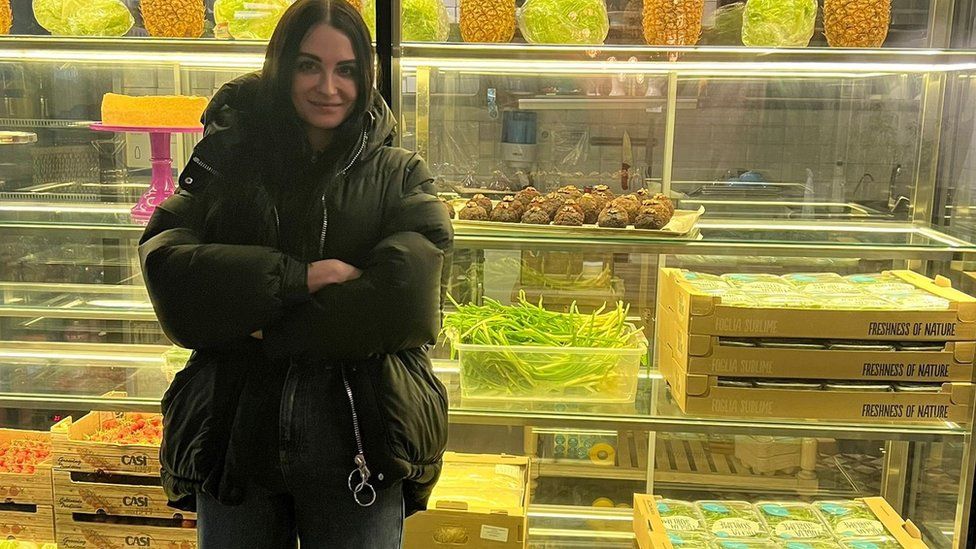Kyiv restaurant the Milk Bar used to charge £12 a meal, now it’s producing 500 meals a day for free to help feed the citizens of the Ukrainian capital.
The restaurant has not been able to pay its staff since February but it still has 20 people working there.
“We are all just thinking about people and the community right now,” bakery owner Anna Kozachenko said.
Hers is just one of the food businesses stepping up to support Ukrainians following the invasion by Russia.
“I’m not even thinking about the financial losses,” said Ms Kozachenko.
The staff who have stayed with the firm are now working around the clock to deliver meals to the elderly and refugees from invaded areas outside Kyiv.
Large food suppliers have provided food to the restaurant for free and have promised to do so for “as long as it is needed”. The landlord has also suspended rent for the restaurant.
The Milk Bar is one of more than 450 restaurants that have transformed their businesses to help feed anyone who needs it following Russia’s invasion of Ukraine – people sheltering in bunkers, the elderly unable to leave their home, and those fighting on the front lines.
‘Scarcity of resources’
One larger firm, LaFamiglia Group, which has 14 restaurants, a catering business and 17 food markets, has also now switched to providing shelters, food and medical supplies.
The business, which made tens of millions in dollars in sales last year, is now providing more than 8,000 snacks and sandwiches and more than 5,000 hot meals each day for free.
Owner Mikhail Beylin told the BBC suppliers were providing lots of food for free and the rest was being sold at cost, with them not making a profit from it.
The restaurant is using its own money to cover any additional costs.

Mr Beylin said the war had made getting food to and from the restaurant “complicated” and there are fears that they could run out of supplies.
“Now the supply we get is enough to cover the demand and create a small back-up of products in case we face a scarcity,” he added.
— Mikhail Beylin (@BeylinBeylin) March 17, 2022
“Our chefs remain in the middle of military zones to provide our people with food.”
“It’s not the time to worry about finances, profits and margins, now is the time for actions that are required of everyone in order to stop further destruction of lives.”

Pizzeria owner Ruslan Buriak has 60 volunteers working around the clock at his kitchens in the central-eastern city of Dnipro, which was first targeted by Russian air strikes last week.
The kitchens are producing about 1,000 meals each day for the local population and has been relying on free pasta, oils and meat from local farmers. Like the Milk Bar, Mr Buriak also makes deliveries to elderly people and those unable to leave their homes.
“We have around one week of stock left and the volunteer chefs need money to get buses to work,” Mr Buriak explained.
“We’re like a family now and everyone is doing their best to help.”

Supplier concerns
One of Ukraine’s biggest food producers MHP, which grows and distributes wheat, is helping restaurants to keep going and feed people during the conflict, including Mr Beylin’s chain. It employs more than 30,000 workers across Ukraine.
It has delivered food to isolated communities across the country, but the invasion means some parts of Ukraine where it would normally sow wheat are now inaccessible.
“If this continues, of course our ability to sow rapidly diminishes, particularly if they (the Russian army) moves into the west of the country where a large part of our operations are based”, MHP boss Dr John Rich told the BBC.

This would have an impact which reaches far beyond Ukraine. Some 30% of the world’s wheat comes from Ukraine and Russia. The majority of Ukraine’s wheat and corn exports went to the Middle East or Africa last year – and disruptions to supply could affect availability in these areas.
If grain production is hampered, analysts have warned supplies may struggle to keep up with demand, meaning wheat prices could rise across the globe.
In the meantime, the government is doing what it can to help financially. It has restarted support schemes put in place to help restaurants cope with the Covid pandemic.
Dr Tymofii Mylovanov, president of the Kyiv School of Economics, expects the government to take a larger role in supporting the country’s firms as they switch from making sales and profit to trying to help the country’s people survive the war.
“Many restaurants have now run out of money but the government is providing relief and co-ordinating people’s demand as we continue into a war economy,” Dr Mylovanov said.
Meanwhile MHP has also appealed for donations to its charitable foundation so it can continue to distribute food.

Back in Dnipro, Mr Buriak’s landlord has also halted rent, water and electricity bills to help support the pizzeria and people are continuing to volunteer their time for free.
Mr Buriak plans to keep feeding Dnipro for as long as stocks remain.
“We will keep going until the end of this situation but no one knows how long this will take.”






























